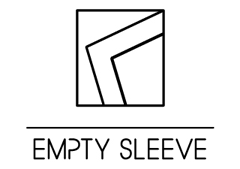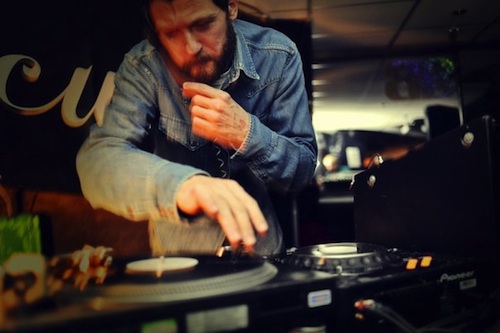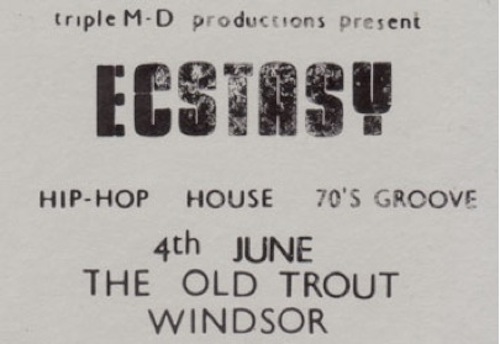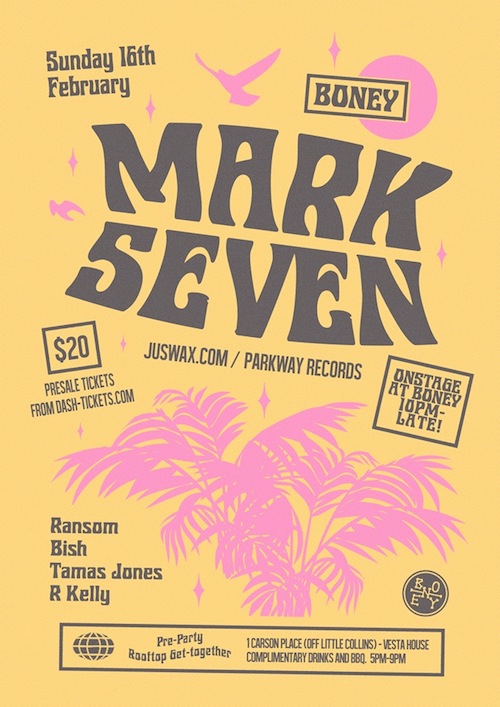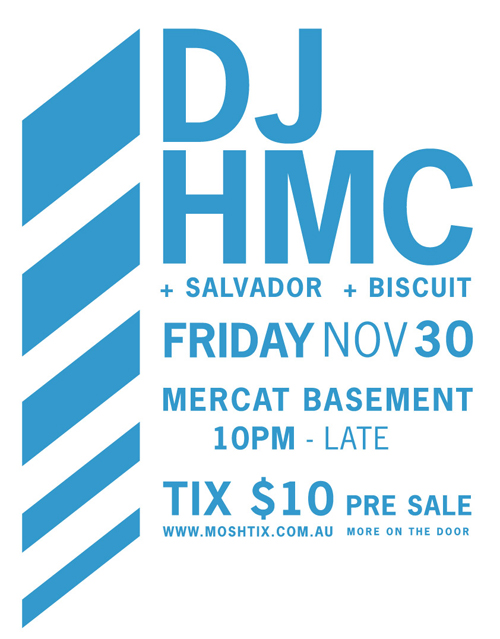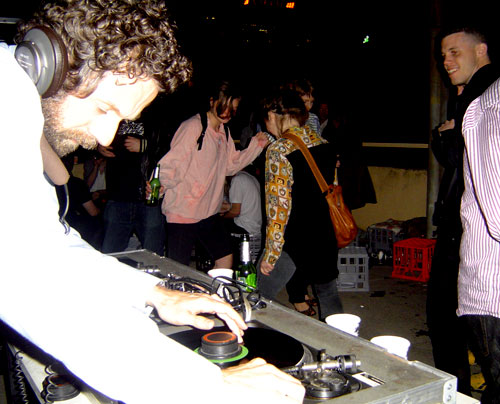Tours & Events
February 2014 sees the long-awaited return of DJ Mark Seven to Australia. Mark will be playing three dates across Adelaide, Sydney and Melbourne on the weekend of February 14-16.
To coincide with Mark Seven’s first trip downunder in 2010, Mark Murphy of Sydney’s (sadly now defunct) Spank Records had a conversation with the Stockholm-based, UK-bred DJ about his formative years in the nascent UK house scene.
The interview was one of many that populated the Spank Records blog while it existed. Thanks to Mark (Murphy) we were able to locate a copy and save it from being lost to Internet oblivion. Thanks of course to Mark (Seven) for answering the questions and digging into his personal archives for the images.
The late 80s are a very special time in House. I am absolutely fascinated by what happened in the UK. First up, tell us a bit about your childhood. Where did your passion for music come from?
It’s hard to say but seeing as I grew up in the suburbs, still only a short drive down the A4 from London, I’d guess music was just my way to escape physically and emotionally. I suppose I was always quite an emotional kid, quite imaginative and I just struck up a close relationship to music early on.
So when did you start clubbing? Can you remember your first nightclub experience? Was house happening where you were living?
That would be sometime early ‘86 and I think probably the first thing I went to that was decent was a regular backroom night in a place called The Cricketers in Chertsey. Sunday nights was either Jasper or Norman Jay playing rare funk, soul…some hip-hop. House was just creeping into the UK and I remember on Saturday night they had Jazzy M – he was championing it from year dot. I was buying the odd house tune as they arrived too, things like Nitro Deluxe, Colonel Abrams, Raze – stuff like that but Sundays was still our night and the overriding soundtrack to the start of my club life was rare groove & hip-hop.
About the same time, the first club I went to in the city was either Delirium at the Astoria, or something around Camden Lock, probably HQ. Delirium was great, a good example of the best of that pre-acid explosion because the DJs – Noel & Maurice Watson - were playing a mix of hip-hop, go-go, funk and some house too and playing it well. It took a while for house to really take hold though because the scene before was all about the dancers. All that funk and rare groove – it was all about your moves on the floor. Plus it was very mixed, black and white together and quite dressy too in its way but that changed as house took over. I think a lot of the cool black kids were like “what is this shit, I can’t do my moves to this!” and unfortunately the scene got pretty pale after that.
So sometime in ’87 house just started to take over for us. We were playing and we’d still have something wack like “funk, rare groove, house” on the flyer but after an hour or so we’d be playing “Land of Confusion” and filling the place with dry ice! My mate’s girl at the time said “Why d’you even put that on the flyer, you just wanna play house?” We were kind of evangelical about it… “This is it, this is the future.”
But where I was living? No… I wouldn’t say house was happening there. As soon as I passed my driving test I was out! I was hanging with a group of mates from Ascot and Hayes, a bit closer to the city. It’s funny; I remember we tried to do a couple of parties early in ’88 locally. The crowd were there in flares and baker boys caps just taking the piss…“Turn this shit off and play some JBs!” We were like “yeah, yeah… you plums get on with it!” A year later they were wearing smileys and were hard-core ravers!
Acid House was life changing for a lot of people. Can you give us your memories on this and why you think it was such a phenomenon?
Well “Acid House” really refers more the culture than the music. It’s as good a name as any but it gives the impression that we were going out listening to six hours of acid tracks! Maybe you were if you went to Clink Street… but I digress! But yeah, it WAS life changing. It changed my life for sure. I was an apprentice at the time, software engineering, one of the first in the country I think – I was supposed to be lucky to be on this pioneering course, and I’d go into the office after the weekend to the slightly older straighter fellas who were teaching me and be all “You lot are wasting your lives in here… you don’t know what you’re missing!” They were very nice about it though! They told me in my last year there that I had the record for sick leave in the company! Later they started laying people off and I was the first in the queue to take redundancy, “Yes please, I’ll have that!”
But it’s not surprising it turned out to be as big as it did – once you’d experienced the feeling of being on a dancefloor with like minded people all in the same ‘state’, strangers hugging each other, dancing to all this new music that fitted perfectly – it was just too good to stay underground. By 1990 the whole country was on fire with it – it was like this big threat to society, just like Punk was before it.
Drugs went hand-in-hand with this period. Was there a first ecstasy moment? You can tell me.
They did go hand in hand yeah, but although it sounds corny, it really was all about the music for me in the very beginning. First couple of times I went to Future I was straight, it sounds mental now looking back. We held off taking anything for a couple of months but in hindsight worked out nicely.
So a long story, one of the boys I was playing records with worked in an office with this kid from Windsor. And we’ve been playing these parties all over the place (clearing the floor basically!) and my boy says “We should do something in Windsor, he says they’ve got a crowd for us.” So we start playing in this backroom there, and wha-hey… yeah there’s a small group of people really into it. So we talk to them and turns out Boys Own are from there. This little group have just discovered pills and they’re friends with Andrew (Weatherall) & Cymon (Eckels). So, naïve fools that we were, we end up calling the night Ecstasy! We do this party for a few weeks and it’s building up. Then one week they say, “Listen, we can’t be here next time. You have to come with us, Boys Own are having a party and the coach leaves from outside here. But you HAVE to get on one!”
So the next week we get to the venue and the sound guy, he’s this soulboy from my town, and we say; “You got any records? Good, it’s your night!” and we jumped on the magic bus! We were sitting on this coach and it felt like we’re heading to the middle of nowhere and someone (I got to know later was Cymon) comes up and gives us our pills. We’re kinda nervous as you would be and as we get near it’s like a co-ordinated drop – “Right, we’re doing ‘em now!” So then Andrew greets everyone off the bus and we’re in this garden with a little barn. It was just a perfect night, the first party Boys Own did. Coincidently I was on holiday a couple of weeks before, playing a tape on the beach and I meet this girl who was one of the first Shoom crowd and she’d told me “There’s a party you have to go to when you get back” – I see her again there and we’re flying. Steve Proctor played, it was amazing. We’re standing there in the morning changed forever. The next afternoon we all met up and we were dancing round the car!
You mentioned Shoom in an interview. It’s such a legendary club. Any favourite memories of it?
I have to say I didn’t start going regularly to Shoom until they moved ‘cos Jenni (Rampling) could be a total bitch on the door at the Fitness Centre! Future was more home cos I knew a few of the heads there and got a membership early on, which for a kid from out the way was sweet! But Shoom was really just about Danny Rampling, his energy, his dance, his music. He kind of summed it up in the early days, everything that we were feeling. People idolised him. He would always kick things off with Barry White’s “I’m in Ecstasy” and as that string rises in the intro you could feel it rushing up your spine. I have an early tape of his pirate show on the website and it captures him at that peak. Full of the spirit of the times. So there’s like football lads, estate girls, club kids and celebrities, pop stars all loved up, and electricity in the air. It’s hard to put into words; it was a very special meeting of circumstances.
You also mention DJs like Rampling and Oakenfold and others. These guys were creating a new era in pop culture. Everyone wanted to be a DJ rather than be in a band. Was their style of DJing influential to you?
I think the time of everyone wanting to be a DJ actually came a little later with the rise of the so-called superclubs and Mixmag culture, but I suppose you’re right in that it began with them. Absolutely, their style was influential to me. I mean, in the music they played rather than the style of playing. In the very beginning I was straight up copying their tunes! It took a while before I started traveling looking for new, original records that fitted the mood.
Who was your favourite DJ back then?
Probably Rampling back then just ‘cos like I said he summed up the spirit of it perfectly. He had a real charisma when he played, it was infectious.
Is there a favourite track from this period that means something special to you?
There are hundreds. But maybe ‘La Habanera’ by Yello, or Bang the Party, or the Nightwriters, or L.A.N.D.R.O & Co…it’s a measure of the time that there are so many tunes that are special to me from back then.
I read somewhere that you traveled a lot to go to these clubs and warehouse parties that were happening at the time. Was it like an adventure every weekend? What were you working as during the week?
Well I traveled but only up the motorway to the city, it’s like 45mins! As I said, I left school at 16 and got an apprenticeship so I had money in my pocket for records and going out. For a short time there it was Spectrum on Monday, Future on Thursday, some party Saturday, later Shoom on a Wednesday. But we threw a few parties out in the sticks. The first one was a quiet little do, middle of nowhere! The flyer had a map attached and it was just like close friends, local heads, the Boys Own crowd. Then by ’89 that grew into Bizarre which was more of a production, organised chaos out in the countryside!
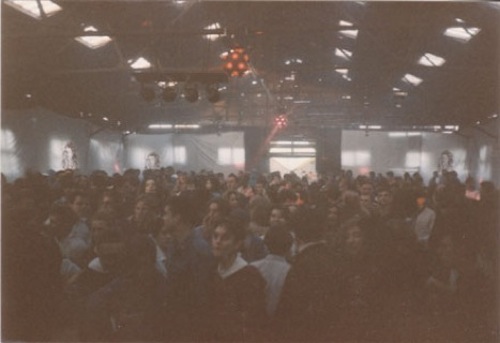 From the DJ booth in the morning. Bizarre, May ’89
From the DJ booth in the morning. Bizarre, May ’89
Still, I wasn’t really driving around the country or anything… I wasn’t going out to those 90s raves, oh no! You’ve got to understand that for a lot of the people who were into the earlier scene, the rave scene as it became with these huge events looked like Armageddon! We were so snobby about it but looking back now it would’ve been amazing to see it.
Rampling has said that his mentor was Alfredo who turned him on to a style of DJing in Ibiza when Amnesia was experiencing its early days. He’s now regarded as a kind of Balearic Jedi – were you aware of him?
Not when I first heard Rampling, no. Not really until later ‘cos I never went to Ibiza. I had some mates there in ’88 but I’d already booked my package trip to another island! Then in ’89 I was traveling to buy records to the mainland and then it was like, “it’s over… you missed it!” I only became aware of Alfredo later, by word of mouth.
How did your love of Balearic come about and how would you describe the genre?
My love of the music? Well it just worked perfectly, breaking up the straight house beat and opening up the subject matter to anything & everything. It allowed a DJ to set a mood or message outside the normal scope of what was seen as club music. You could be a lot more creative.
Describe “Balearic”? It’s like catching sprites in your hands, once you think you’ve got hold of it – it’s evaporates, gone! Ha. No, everyone can have their own personal interpretation, but for me it’s totally tied up to the feeling of that time. There are lots of records I’ve come across years after the fact but they fit that spirit and they are to me, Balearic. Maybe it’s a song that’s familiar from another setting and it’s not normally played in that context but when you hear it then & there, it’s perfect. And I think that’s where I might put the definition, fitting music from another context into the moment.
Tell us about record shopping in the late 80s. Was it a ritual? Where did you find your tunes?
It was a ritual yeah. Either on my own or with my group of mates Saturday meant an early meet up then up town. First, Groove Records in Soho or Bluebird on Edgware Road, then maybe CitySounds in Holborn. Grab a munch then maybe to the pub before football. If there’s time, stop off at Discount on the way out of town.
We were just totally caught up in it, loved it. See the faces at the stores, find out what’s coming out, what’s going on that weekend. It was the centre of everything. Next thing I’m standing at upstairs at Shoom with my mate and we just say “We’re not gonna find the tunes here, let’s go to Spain to buy records” and that’s when I first started traveling to find music, digging a little deeper.
When did you get your first pair of Technics? Do you still have them?
I think we had two between us at first. Although I was more of the spinner so I got to look after them! But when I moved away I had to give one back. So one of mine is probably the first still, yeah.
So were the 90s about DJing for you? Did you still love clubbing and what sound were you spinning? Any highlights?
We carried on the Bizarre nights for a while in a club in Islington. I played a warm up for some of the big names at the time. Those were pretty good nights but it was a strange time for sure. We’d just come off the back a few solid years of heavy partying and there was a definite comedown. People started doing cocaine and the spirit was very different. Everyone I knew was having panic attacks!! I had a long period of disillusionment with the scene as a whole, it just wasn’t the same. I dropped out of playing for a couple of years but then I would just play at private parties or bars in town. Plus I hated most of the music of the 90s, big beat, all that breaks stuff? Cheesy shite! So I tried to teach myself to produce music instead.
You moved to Sweden in the late 90s. What was the reason; was it for rare Abba 12s?
No, I met an au pair! I mean I certainly didn’t think of going before hand, I’m a warm weather person! Funny but I went out with about three Swedes on the trot in London, then my flat got sold and I thought, “OK, there’s not much here. Let’s go.” Then I got there and found piles of great records!
You put out your first record in ‘98 I think. Why so long and how did that come about?
Actually I put my first records out in ‘92 I think but we don’t need to go through all that! But releasing records as Mark Seven, yeah that was ’98. That came through working with Dave Angel. I’d made one of the early releases on his label and he wanted me to do something else. It was about the time of my moving and I just put it together in my little home studio. Actually everything I’ve done’s been recorded at home, that’s why it sounds so shitty!
Tell us what you were doing in the last decade? You are still putting parties on in Sweden?
Mostly I’ve spent the last ten years looking for records, selling records and playing them occasionally! I’ve run a few parties & clubs in Stockholm and I still guest in places once in a blue moon. I’m looking right now to try and do a final Black Lodge party somewhere, to put a line under that properly.
What’s the scene there like? Do they get what you do?
Can of worms that one! Well, there’s always been a very small clique of people that got it and those are the ones that kept me going through the lean times – that’s my family here. I did a few nights playing Balearic and leftfield music way back but they were never well attended. But then with The Black Lodge parties we managed to get a lot of people who just wanted to be at some unlawful get-together! Once the scene started to blow up then it started to reach here and all of a sudden the listings paper is full of “DJ Sven is playing space disco & Balearic!”
But Sweden is strange in that it wants to import something cool all the time. I gave out tapes for a long time here without any feedback and ironically it was the UK that helped me get back out playing on the regular. Still now I get people call me up here and ask me “Who should I book? Can you help me get so and so?” Damn, I’m right here! Still, I’ve never been an easy person to get on with…
Lately we’re seeing a lot of DJs who have been playing for 20-30 years touring more than they ever have. Why do you think that is?
For one thing you get better at doing something the longer you do it. You have a broader understanding, wider experience and that comes through in your playing. You’re able to pick music from all that time and fit it together to say what you want, rather than just picking up the latest releases online.
I’m a firm believer in the “art” of DJing. The craft of it…people that say it’s just putting on one tune after another just don’t get it. In Stockholm we had a proliferation of kids playing mp3s off their iPods at Vice parties or whatever, and yeah punk attitude… great! But it sounds like shit. Get a professional!
Great track on Endless Flight. Will we see more production from you? It seems very sporadic.
It is sporadic, yeah… I’m sorry! The thing is I don’t work with an engineer or studio whiz or anything so it takes me ages to get things how I want them to sound. Maybe I should find someone. Plus I’ve always had the crappiest equipment! I’m always miles behind the curve, trying to make things sound decent! But there’s more coming for sure. I do really enjoy it when I start to make something new.
What do you still love about House music and everything that goes with it?
It’s a certain feeling, like in gospel – an “emancipation”, the Spirit running wild in there! I don’t know, things like this are hard to put into words without sounding like a tool but it comes back to escapism for me, “free my soul, lift me high.”
To celebrate the 30th anniversary of his stepping into a DJ booth, emptysleeve presented DJ HMC at the Mercat Basement on Friday November 30, 2012.
I first heard house music in 1989. I remember the day. It was in the computer room at Adelaide High School. My friend Michael Nelson had a cassette. Someone in London had sent it to him, he said. He hadn’t listened to it yet. He didn’t really know what it was, something called ‘Acid House’.
I can’t remember all the tracks on that tape, or if it was mixed, or a personal compilation, or 90 minutes recorded straight from pirate radio. I certainly have no idea who the DJ was (at that stage of life I doubt I even knew what a DJ was) but I do remember that on that day, in that room, as the monochrome screens of twenty Macintosh SEs strobed as what I now know to be Adonis’ Acid Poke pulsed from a boom box, my idea of music was transformed.
A pre-Internet drip feed of second-hand information fueled my fascination. Chance meetings at adolescent booze-ups yielded talk of warehouse parties, drugs, record shops, DJs, MCs and something called ‘beat mixing’. I had no real idea what any of it meant. But I wanted to find out.
In a timid underage way, I started going out. There was a club in Adelaide at that time called the Toucan that played some strange music – new beat, punk, industrial – but you could hear house and hip hop too. I recall a couple of brave trips to a gay club called Alba’s that played house and disco, one of which ended with a drag queen shouting “there go the Adelaide High boys!” into the mic as we left. This was a bit much for my teenage sensitivities; I never went back. Though I loved the music.
Before I was eighteen, I’d started university. Naturally that led me to connect with people who actually knew about this music: who made it, where you could buy it and where you could go to dance to it. This was the beginning of the 1990s, which turned out to be a very good time to be in Adelaide.
Say what you like about Adelaide – its compact size, its often-parochial outlook, its terrifyingly inventive serial killers – but what occurred in Adelaide in the early 1990s was unique. An alchemical combination of boredom, cheap rent, isolation, technology and creativity somehow led to this quiet desert city becoming a third keystone of the Detroit/Belgium nexus as techno began to make its presence felt across the globe.
It wasn’t long before I was taken to the Metro nightclub, where a DJ known as HMC (or House Master Cam) played techno. I had become friendly with some people who were much deeper into the scene than I. Their tightly held underground sensibilities and protective sense of ownership meant it took a while before I stopped feeling like an outsider, but for me discovering techno was like coming home. I loved this dark, beautiful machine-made music. I was obsessed with it for years.
Over the next few years I would try and hear HMC play whenever I could. For a small town, there were a lot of clubs operating in Adelaide at that time so there were plenty of opportunities. The way Cam put records together mystified, beguiled and bewitched me. I recall one particular set in an old synagogue lit by nothing more than hundreds of candles. Cam’s music took on an almost physical form, machine-generated rhythms manisfesting into a structure I was navigating through rather than hearing. There may have been drugs involved.
When I wasn’t out, I had HMC mixtapes mainlining into my eardrums via my ever-present Sony Walkman. Without the benefit of vast resources of music available at the click of a mouse, a HMC mixtape was to be treasured. A “keep it in the family” sensibility seemed to prevail – these were rarely copied. I would obsess over particular tracks and try desperately to find out what they were. The idea of actually asking seemed somehow disrespectful – but over the years I got over that and found that Cam was only too happy to share.
When I read accounts of key moments in dance music history that have grown around the vision of one particular DJ (Mancuso at the Loft, Hardy at The Music Box) – I can’t help but think that during those years in Adelaide we may have been part of something similar. While he would never seek to place himself alongside them, HMC has the same qualities lauded in any of those near-mythological DJs: a rare combination of taste, knowledge, programming feel and technical ability that elevates the act of making people dance by playing records into something else entirely.
HMC shaped my tastes and opened my ears. Hearing Cam play records was what influenced me to try DJing myself – sadly without even approximating his degree of finesse. Many others who have danced to Cam’s music over the years would say similar things.
I’m not alone in any of this. My experience is not unique. These same feelings, these same revelations have occurred in many people the world over as gifted DJs led them onwards through strobe and smoke. I’m sure these revelations are still occurring in young minds on a weekly basis – though the cynic in me is sure it’s nowhere near as good.
Special thanks goes to Noise In My Head for supporting this event. I am also indebted to Cathy Adamek for allowing me to read her conference paper entitled “Time, Space and Place: Adelaide - the Detroit of Australia” which I hope becomes a book one day.
MARK SEVEN AUSTRALIAN TOUR 2010
Empty Sleeve facilitated an Australian tour for DJ/collector/record dealer extraordinaire Mark Seven in October 2010.
